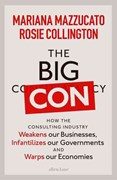- Governance
The Trillion Dollar 'Con’ in Consultancy
Mariana Mazzucato and Rosie Collington debunk the myth that consultancies add real value and extol the learning organization

In their new book, The Big Con: How the Consulting Industry Weakens our Businesses, Infantilizes our Governments and Warps our Economies, Mariana Mazzucato and Rosie Collington go a whole lot further, holding the consultancy industry responsible for many of the recent failings in the engines of democratic capitalism and government.
From the 18th Century days of Josiah Wedgwood, capital markets have found the investors to finance innovation and economic growth and canny business people, relying on their own networks, intuition, knowledge, and employees, have put that capital to use. Governments too were self-reliant, supported by a highly capable civil service. Only since the 1980s has a third party been involved—the consultancy industry. Since then, big businesses and governments have increasingly outsourced much of their capacity for strategic thinking and decision making to consultancies—particularly to the ‘big three’ strategy and ‘big four’ accountancy consultancies.
The result, according to these authors, has been to the inherent detriment not only of the important private and public sector organizations that rule our lives but to economies and societies around the world. Consultant-linked debacles during the Covid pandemic, such as McKinsey’s involvement in the slow and sclerotic launch of France’s vaccine program and Deloitte’s role in the UK’s notoriously ineffective ‘Test & Trace’ scheme—have brought the subject to recent prominence.
Though these authors are perhaps most concerned with the health of government and state sector bodies, the arguments they present do not favour either a left- or right-wing perspective, as addressing the over-reliance on consultants is equally beneficial to the health of the private and public sectors. The book traces the evolution of the consultancy industry, explains how it created the illusion of adding value, has given the impression of being irreplaceable, and has become deeply embedded in our economies.
The authors detail some infamous cases of damaging consultancy involvement. For example, how during the Clinton and Blair era the pursuit of a Third Way model, to resuscitate the public sector after Reagan and Thatcher, led to the proliferation of PPPs (Public Private Partnerships) and PFIs, and how these were championed by the big consultants for whom they were a risk-free financial bonanza. These grossly expensive schemes, culminating in the Swedish NKS hospital fiasco, were a consultant led disaster.
However, the business and government commissioners of consultant services are not all idiots. Not all consultancy involvement is bad. Very often consultants are contracted for good reason and do a good job. The big problem here—rather than just the multiple debacles—is the damage done to the private and public sector organizations that contract out their thinking and decision making. “We wanted to unpack what happens to the brain of an organization when it is not learning by doing because someone else is doing the doing,” say Mazzucato and Collington at the opening of the book.
This is critical. Organizations are not static entities they evolve through learning and experience. The concept of ‘The Learning Organization,’ as envisaged by MIT Sloan’s Peter Senge in the 1990s, emphasized the need for internal corporate learning to drive innovation and the pace of change, better link resources to customer needs, improve quality of outputs at all levels, become more people oriented, increase knowledge sharing, and improve long-term decision making. The learning to achieve these aims does not happen when organizations are hollowed out through outsourcing strategic thinking and other key functions. Organizational knowledge builds over time. “Today’s problems come from yesterday’s solutions,” was one of Peter Senge’s principles.
The knowledge learned to achieve Senge’s objectives, is not something that organizations can buy in at will. It is context dependent and developed over long periods. An argument in favour of consultants is that they bring specialist knowledge and associated economies of scale. In fact, although the big consultants employ very bright people—to the disadvantage of business and civil service recruiters—most of the knowledge they bring to bear is general management knowledge and nothing very special or outside the reach of savvy executive teams. Solutions provided are often duplicated from elsewhere and not closely enough related to the sector context.
If The Big Con is preventing governments and businesses from developing the capabilities they need to develop our economies, the solution Mazzucato and Collington argue is for investment in internal knowledge building and capability creation, a new vision for the public sector, and governments “that row so they can steer.” These are big asks. Whether either business or government has the strength to follow this advice will be seen, but this important book points the way.
ABOUT THE AUTHORS
Mariana Mazzucato is Professor in the Economics of Innovation and Public Value at University College London, where she is Founding Director of the UCL Institute for Innovation & Public Purpose (IIPP).
Rosie Collington is a PhD candidate at UCL’s IIPP. Her academic research has been published by New Political economy and the Institute for New Economic Thinking.
…………………………………………………………………………………………………………………………
ARTICLES YOU MIGHT LIKE
VIDEO
WEBINAR RECORDING: Prof. Walid Hejazi, Andrea Barrack, and Susan McGeachie explore and debunk some of the enduring myths surrounding ESG
DEVELOPING LEADERS QUARTERLY MAGAZINE AND WEEKLY BRIEFING EMAILS

































